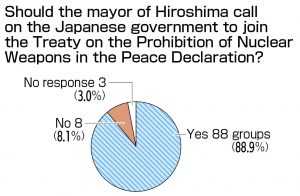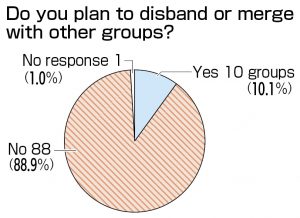88% of A-bomb survivors’ groups want Hiroshima mayor to call on Japanese government to sign nuclear weapons ban treaty in Peace Declaration
Jul. 24, 2019
(by Masayoshi Ishikawa, Staff Writer)
On July 23, a survey conducted by the Chugoku Shimbun showed that nearly 90 percent of A-bomb survivors’ organizations want the mayor of Hiroshima to call on the Japanese government to sign and ratify the Treaty on the Prohibition of Nuclear Weapons in the Peace Declaration that he will read out at the annual Peace Memorial Ceremony on August 6. Since the adoption of the treaty at the United Nations in July 2017, Kazumi Matsui, the mayor of Hiroshima, has delivered the Peace Declaration twice but has not made this explicit request of the government in his speeches. The results of the survey confirm the desire of the A-bomb survivors for the mayor to send out a strong message from the A-bombed city.
The survey covered 109 organizations of A-bomb survivors in the Chugoku region and other prefectures in Japan, and asked about their activities and future plans. Responses were received from 99 organizations, or 90.8 percent of the total. To the question that asked “Should the mayor of Hiroshima call on the national government to join the Treaty on the Prohibition of Nuclear Weapons in the Peace Declaration?”, 88 organizations, or 88.9%, answered “Yes.”
One of those replying “Yes” was the Hiroshima Prefectural Confederation of A-bomb Sufferers Organizations (chaired by Sunao Tsuboi), which stressed, “It is hard to understand why the mayor won’t request that Japan take part in the treaty in his Peace Declaration, which draws the world’s attention.” The Toyohira Atomic Bomb Survivors Association in Kitahiroshima-cho, Hiroshima Prefecture, said, “We would like Mr. Matsui to make in-depth remarks as the mayor of the A-bombed city of Hiroshima.”
At the same time, eight organizations, or 8.1%, answered “No” to the same question. An A-bomb survivors’ group in the city of Kudamatsu said, “The Nuclear Non-proliferation Treaty (NPT) and the nuclear weapons ban treaty would not be compatible with one another,” pointing to tense international conditions involving nuclear issues. A group in Toyama Prefecture said, “The Peace Declaration should not contain political elements.” Three other organizations (3.0%) did not respond to this question.
Mr. Matsui has stuck to an emphasis on conveying “the experiences of A-bomb survivors and the desire for peace” in his declarations while avoiding any request or criticism of the central government for its individual policies. Mr. Matsui is reportedly making final adjustments to this year’s speech, in consideration of the appeals from A-bomb survivors’ organizations, and will include wording that asks the government to sign and ratify the treaty as “the wish of the A-bomb survivors.”
According to the Ministry of Health, Labour and Welfare, the number of those who hold the Atomic Bomb Survivor’s Certificate totaled 145,844 as of the end of March, falling below 150,000 for the first time. The average age of the survivors is now 82.65. To a question about the future of their organization, ten groups, or 10.1%, said that they plan to disband or merge with other groups. A group in Mukaihara-cho, Akitakata City intends to disband in August 2020. The Niimi branch of the Okayama Prefectural Atomic Bomb Survivors’ Organization, in Niimi City, said that it will end its activities in three years.
This is the fourth survey that the Chugoku Shimbun has sent to A-bomb survivors’ organizations since 2015, the 70th anniversary of the atomic bombing. The number of groups that were surveyed in 2015 was 125, but this number has fallen to 109 this year because these organizations are now dissolving, one after the other.
Keywords
The Treaty on the Prohibition of Nuclear Weapons
This is the first international treaty to comprehensively prohibit the development, stockpiling, use, and threat of using nuclear weapons. The treaty will enter into force 90 days after 50 countries have ratified the agreement. It was adopted at the United Nations in July 2017 under the leadership of non-nuclear nations, with the support of 122 countries and regions. Currently 23 countries and regions have ratified the treaty, but no nuclear weapon states have signed or ratified it. The Japanese government has said that it will not join the treaty, maintaining a policy in step with the United States, which insists on the idea of gradually reducing nuclear arms.
About the survey
Questionnaires were sent by mail from the middle of June to the middle of July. After responses were received, interviews were conducted by telephone. The survey covered 41 organization: prefectural organizations which make up the Japan Confederation of A- and H-bomb Sufferers Organizations; the Hiroshima Prefectural Confederation of A-bomb Sufferers Organizations (chaired by Kunihiko Sakuma) as an observer entity; and the Tsuruoka Survivors Association in Tsuruoka City, Yamagata Prefecture, which has ties to the Japan Confederation of A- and H-bomb Sufferers Organizations (Yamagata Prefecture has no prefectural organization). In the five prefectures in the Chugoku region, questionnaires were sent to 66 local organizations, associations, and branches that have been recognized by the prefectural organizations. Ninety-nine out of a total of 109 organizations responded.
(Originally published on July 24, 2019)
On July 23, a survey conducted by the Chugoku Shimbun showed that nearly 90 percent of A-bomb survivors’ organizations want the mayor of Hiroshima to call on the Japanese government to sign and ratify the Treaty on the Prohibition of Nuclear Weapons in the Peace Declaration that he will read out at the annual Peace Memorial Ceremony on August 6. Since the adoption of the treaty at the United Nations in July 2017, Kazumi Matsui, the mayor of Hiroshima, has delivered the Peace Declaration twice but has not made this explicit request of the government in his speeches. The results of the survey confirm the desire of the A-bomb survivors for the mayor to send out a strong message from the A-bombed city.
The survey covered 109 organizations of A-bomb survivors in the Chugoku region and other prefectures in Japan, and asked about their activities and future plans. Responses were received from 99 organizations, or 90.8 percent of the total. To the question that asked “Should the mayor of Hiroshima call on the national government to join the Treaty on the Prohibition of Nuclear Weapons in the Peace Declaration?”, 88 organizations, or 88.9%, answered “Yes.”
One of those replying “Yes” was the Hiroshima Prefectural Confederation of A-bomb Sufferers Organizations (chaired by Sunao Tsuboi), which stressed, “It is hard to understand why the mayor won’t request that Japan take part in the treaty in his Peace Declaration, which draws the world’s attention.” The Toyohira Atomic Bomb Survivors Association in Kitahiroshima-cho, Hiroshima Prefecture, said, “We would like Mr. Matsui to make in-depth remarks as the mayor of the A-bombed city of Hiroshima.”
At the same time, eight organizations, or 8.1%, answered “No” to the same question. An A-bomb survivors’ group in the city of Kudamatsu said, “The Nuclear Non-proliferation Treaty (NPT) and the nuclear weapons ban treaty would not be compatible with one another,” pointing to tense international conditions involving nuclear issues. A group in Toyama Prefecture said, “The Peace Declaration should not contain political elements.” Three other organizations (3.0%) did not respond to this question.
Mr. Matsui has stuck to an emphasis on conveying “the experiences of A-bomb survivors and the desire for peace” in his declarations while avoiding any request or criticism of the central government for its individual policies. Mr. Matsui is reportedly making final adjustments to this year’s speech, in consideration of the appeals from A-bomb survivors’ organizations, and will include wording that asks the government to sign and ratify the treaty as “the wish of the A-bomb survivors.”
According to the Ministry of Health, Labour and Welfare, the number of those who hold the Atomic Bomb Survivor’s Certificate totaled 145,844 as of the end of March, falling below 150,000 for the first time. The average age of the survivors is now 82.65. To a question about the future of their organization, ten groups, or 10.1%, said that they plan to disband or merge with other groups. A group in Mukaihara-cho, Akitakata City intends to disband in August 2020. The Niimi branch of the Okayama Prefectural Atomic Bomb Survivors’ Organization, in Niimi City, said that it will end its activities in three years.
This is the fourth survey that the Chugoku Shimbun has sent to A-bomb survivors’ organizations since 2015, the 70th anniversary of the atomic bombing. The number of groups that were surveyed in 2015 was 125, but this number has fallen to 109 this year because these organizations are now dissolving, one after the other.
Keywords
The Treaty on the Prohibition of Nuclear Weapons
This is the first international treaty to comprehensively prohibit the development, stockpiling, use, and threat of using nuclear weapons. The treaty will enter into force 90 days after 50 countries have ratified the agreement. It was adopted at the United Nations in July 2017 under the leadership of non-nuclear nations, with the support of 122 countries and regions. Currently 23 countries and regions have ratified the treaty, but no nuclear weapon states have signed or ratified it. The Japanese government has said that it will not join the treaty, maintaining a policy in step with the United States, which insists on the idea of gradually reducing nuclear arms.
About the survey
Questionnaires were sent by mail from the middle of June to the middle of July. After responses were received, interviews were conducted by telephone. The survey covered 41 organization: prefectural organizations which make up the Japan Confederation of A- and H-bomb Sufferers Organizations; the Hiroshima Prefectural Confederation of A-bomb Sufferers Organizations (chaired by Kunihiko Sakuma) as an observer entity; and the Tsuruoka Survivors Association in Tsuruoka City, Yamagata Prefecture, which has ties to the Japan Confederation of A- and H-bomb Sufferers Organizations (Yamagata Prefecture has no prefectural organization). In the five prefectures in the Chugoku region, questionnaires were sent to 66 local organizations, associations, and branches that have been recognized by the prefectural organizations. Ninety-nine out of a total of 109 organizations responded.
(Originally published on July 24, 2019)









